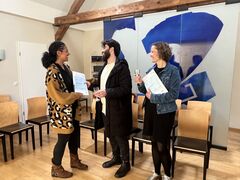25.04.2023

Participates, at the end of the training, recieve their certificates: Sarah Vecera (left, UEM) handing the document to Ahmad Shbat (middle, Haus Narnia) and Corinna Waltz (right, EMW). Foto by: Anneke Bargheer
"Intersectionality" is an approach assuming that different forms of discrimination are not detached from one another, but influence and reinforce each other. Back in 1851, Black Feminist Sojourner Truth described it like this: “That man over there says that women need to be helped into carriages, […]. Nobody ever helps me into carriages[…]! And ain't I a woman? […] I have borne thirteen children, and seen most all sold off to slavery, and when I cried out with my mother's grief, none but Jesus heard me! And ain't I a woman?” For this observation of multiplied discrimination as Black and female, in 1989 the lawyer Kimberlé Crenshaw developed the term "intersectionality".
UEM dedicated itself to working on this topic together with the oikos Institute of its member church EKvW* and the Federal Academy for Church and Diakonia in Germany. At the education course "Intersectionality in Change Processes", 12 participants addressed this problem in four modules:
The training began in September 2022 with the first module, it ended last week with the fourth and last module in Berlin. Questions such as "Who speaks when?" were subject of critical reflection, just as: existing mechanisms of exclusion, resource flows and potentials in society. The participants are now certified as disseminators for Intersectionality in Transformation processes.
Ahmad Shbat, managing director of the therapeutic living community Haus Narnia GmbH, says about his experiences during the further training: "As a person who works in education and youth work, the training has given me content and impulses that I can apply very well to create meaningful change. As a person affected by racist discrimination, I was able to perceive a development in my own process through the exchange."
Corinna Waltz participated in the training as editor-in-chief of the EMW. The EMW (Evangelische Mission Weltweit) as an organization of Protestant churches, agencies and associations is the umbrella organization of the Protestant mission agencies in Germany. She says: "The diversity of the speakers, the comprehensive input and the intensive time with the other participants were very enriching. I am looking forward to continuing to work with colleagues from EMW member organizations on how we can strengthen an intersectional and discrimination-critical perspective in our work and shape change together. I hope that as an umbrella and professional association we can create spaces for this, enable networking and promote cooperation."
We are happy to have brought the training to a good conclusion together with the bakd and the oikos institute and wish the participants all the best for their work.
*EKvW = Evangelische Kirche von Westfalen (Evangelical Church in Westphalia, Germany)
IBAN: DE45 3506 0190 0009 0909 08
SWIFT/BIC: GENODED1DKD
spenden@vemission.org
0202-89004-195
info@vemission.org
0202-89004-0
presse@vemission.org
0202-89004-135
CRDB BANK PLC / Branch 3319
Account# 0250299692300
Swift code: CORUTZTZ
Bank BNI
Account# 0128002447
Swift code: BNINIDJAMDN
info@vemission.org
presse@vemission.org